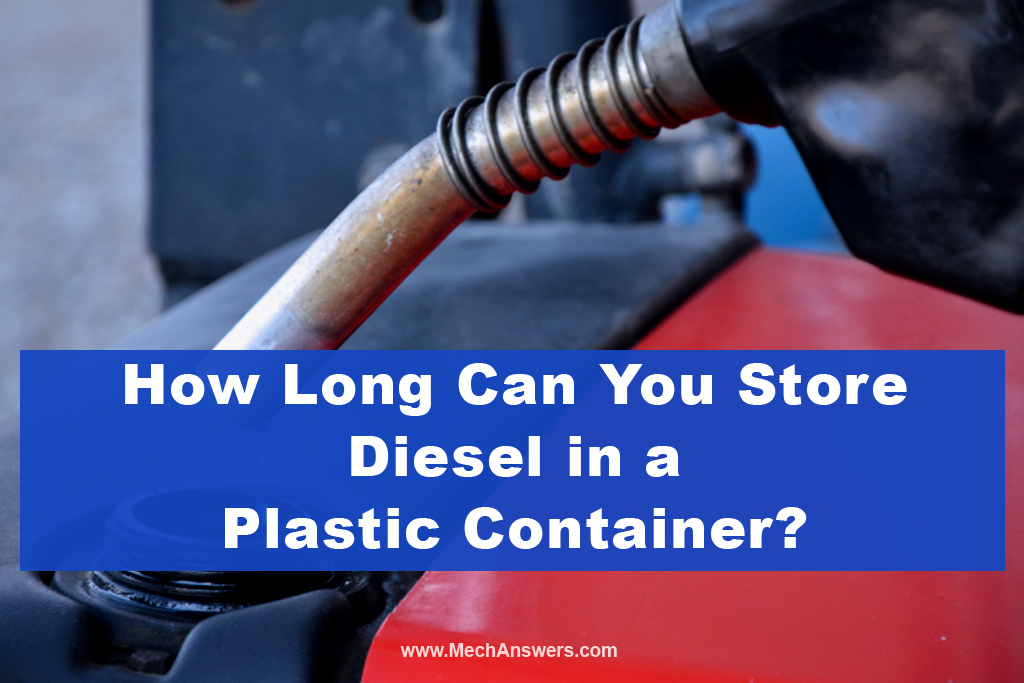You may ask yourself, perhaps even searching for “How Long Can You Store Diesel In A Plastic Container?”, haven’t you? Well, search no more. This article is dedicated to answering that exact question, providing insights and tips on proper storage.
So, how long can you store diesel in a plastic container? Generally, diesel can be stored in a properly prepared plastic container for six to twelve months, but it can vary depending on the quality of the fuel, the type of plastic, and the storage conditions.
Reading this article is crucial if you want to learn how to properly store diesel, avoid common pitfalls, and maintain the quality of your stored diesel for as long as possible.
Table of Contents
How Long Can You Store Diesel In A Plastic Container?
The shelf life of diesel fuel in plastic containers depends on various factors, such as the storage conditions, the quality of the fuel, and the type of plastic container used.
The recommended storage time for diesel fuel in plastic containers is generally between 6 to 12 months, but it can vary depending on the factors affecting the fuel and the container.
That duration will depend mainly on the quality of the plastic container you use. For example, a high-quality polyethylene plastic container will more effectively store diesel. That’s especially true if you purchase a container designed specifically for fuel storage.
Of course, you won’t need high-end, costly plastic containers if you only plan on storing or transporting that diesel over a short period. For instance, any durable plastic container is good enough if you need to transport diesel from a gas station to your vehicle stuck on the side of the road.
Aside from the container and the plastic material it’s made of, other factors determine how long you can store the diesel safely.
That includes:
The diesel type:
Higher-quality diesel, especially those with fuel stabilizers inside, will last much longer in storage. That’s because they degrade much slower than regular diesel that you store for extended periods.
How that diesel is stored:
Another factor is keeping that diesel in the plastic container you’ve chosen. For example, an airtight container will help the diesel last much longer. On the other hand, an open container or one with air leaks will allow the fuel to degrade quicker, while also allowing contaminants to mix with the diesel.
The surrounding environment:
As you can see, the plastic container you use to store your diesel is crucial in determining how long it lasts. However, other factors also matter, namely whether or not that container is airtight, free of leaks, and placed in a suitable location.
The size of the container
Finally, the size of the container also matters. Larger containers will be able to store more diesel and will last longer than smaller containers. It is recommended to store diesel in containers that are at least 20 liters in capacity to ensure a longer storage life.
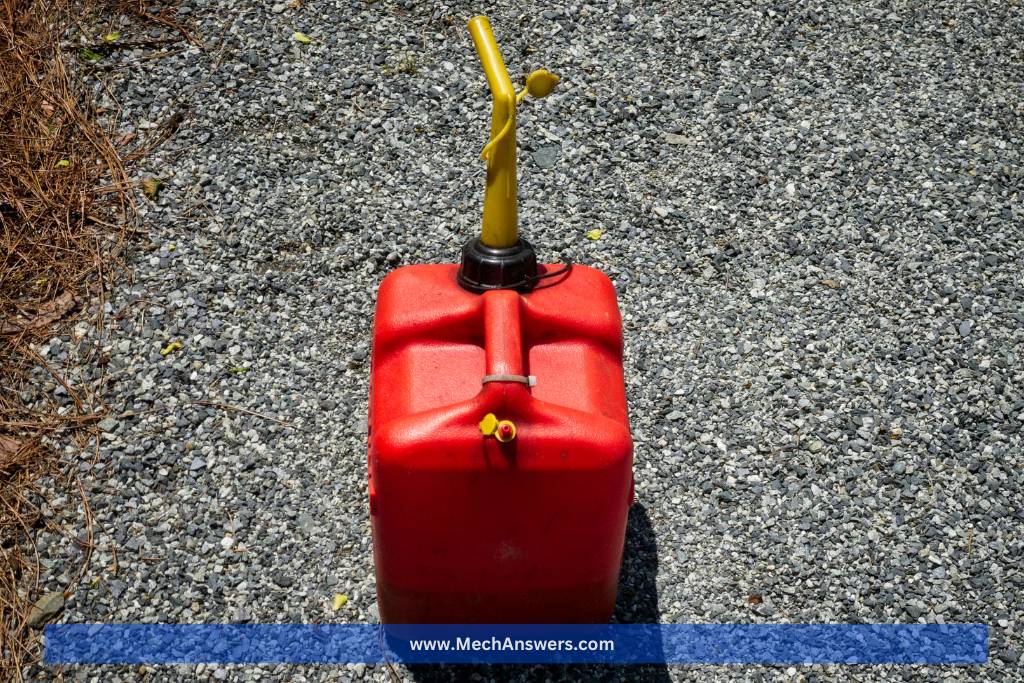
What Happens If You Store Diesel For Too Long?
Diesel has a limited shelf life, so you cannot store it indefinitely, even if you use the highest-quality plastic container available.
When you store diesel for too long, the fuel becomes less fluid and instead becomes gummy in texture. As you can imagine, that’s not good news for your engine or the vehicle’s fuel system.
Old, gummy diesel will quickly clog the fuel filter in our vehicle. When that fuel gets past the filter, it’ll clog the inside of your engine and prevent it from running efficiently.
If that continues for an extended period, that will cause internal damage to your engine. In other words, you’ll spend lots of money to fix that engine and get it running correctly again.
The good news is that all of the above is preventable. Having proper diesel storage practices in place will keep the fuel useful while avoiding any damage to your engine or its components.
Factors Affecting Diesel Storage
Diesel fuel is a valuable commodity that needs proper storage to maintain its quality and performance. There are several factors that can affect the quality of diesel fuel during storage.
Temperature and humidity:
Temperature and humidity can significantly affect the quality of diesel fuel during storage. The ideal temperature for diesel fuel storage is between 60°F to 80°F.
High temperatures can cause the fuel to degrade, while low temperatures can cause condensation and water buildup in the container. Humidity can also cause water buildup in the container, which can lead to the growth of microorganisms and corrosion.
Exposure to sunlight:
Exposure to sunlight can cause the plastic container to degrade and become brittle. This can lead to cracks and leaks in the container, which can allow air and moisture to enter and contaminate the diesel fuel.
Oxygen exposure:
Oxygen exposure can cause oxidation and chemical reactions in diesel fuel, which can degrade its quality and performance. This can lead to the formation of sludge, sediment, and gums in the fuel, which can clog filters and damage engines.
Chemical reactions:
Diesel fuel can undergo chemical reactions during storage, which can cause it to degrade and lose its performance. Chemical reactions can be caused by exposure to oxygen, water, and other contaminants, as well as by the presence of additives and impurities in the fuel.
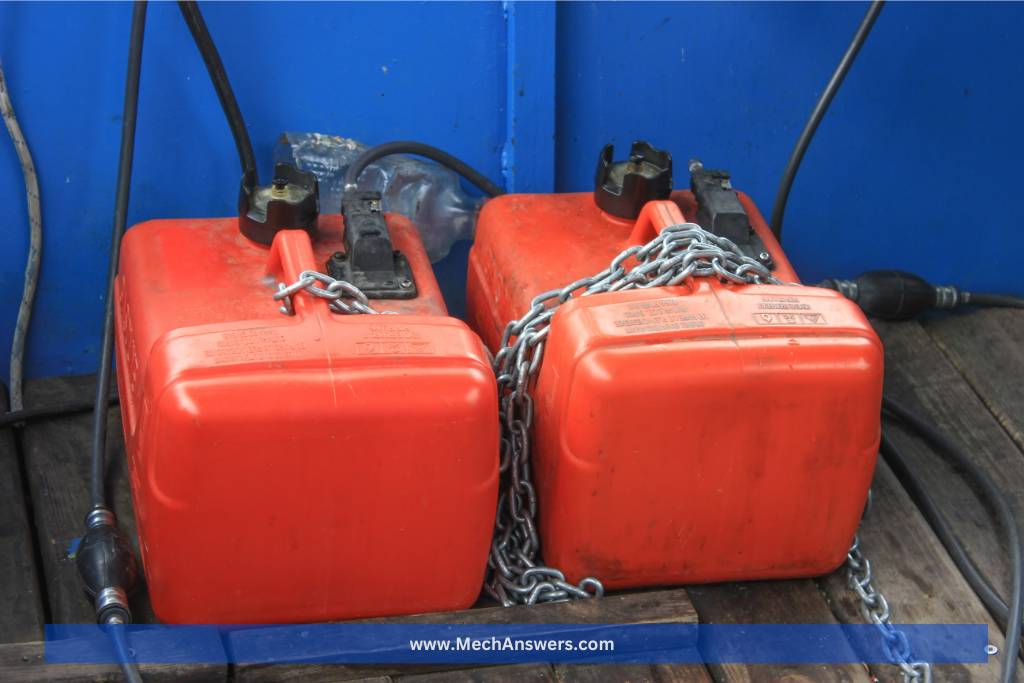
Types Of Plastic Containers For Diesel Fuel Storage
There are several types of plastic containers that can be used for diesel fuel storage, including:
Polyethylene (PE) containers:
PE containers are the most common type of plastic containers used for diesel fuel storage. They are lightweight, durable, and resistant to impact, chemicals, and UV radiation. PE containers are available in various sizes and shapes, including drums, jugs, and tanks.
Polypropylene (PP) containers:
PP containers are similar to PE containers in terms of their properties and applications. They are also lightweight, durable, and resistant to impact, chemicals, and UV radiation. PP containers are often used for storing diesel fuel additives and other chemicals.
High-density polyethylene (HDPE) containers:
HDPE containers are a type of PE container that is denser and more rigid than regular PE containers. They are more resistant to impact, puncture, and cracking, and can withstand higher temperatures. HDPE containers are often used for storing diesel fuel in harsh environments.
Flexible containers:
Flexible containers are made of flexible plastic materials, such as PVC or polyurethane, and are often used for storing diesel fuel in vehicles and boats. They are lightweight, portable, and can be easily folded or rolled up for storage.
Each type of plastic container has its own advantages and disadvantages. PE containers are the most common and affordable, but may not be suitable for long-term storage or harsh environments.
HDPE containers are more durable and resistant, but also more expensive. Flexible containers are portable and convenient, but may not be as durable or secure as other types of containers.
Understanding the factors that affect diesel storage and the types of plastic containers available can help ensure the quality and performance of diesel fuel during storage. Proper storage and handling of diesel fuel are essential for maintaining its value and protecting the environment and public safety.
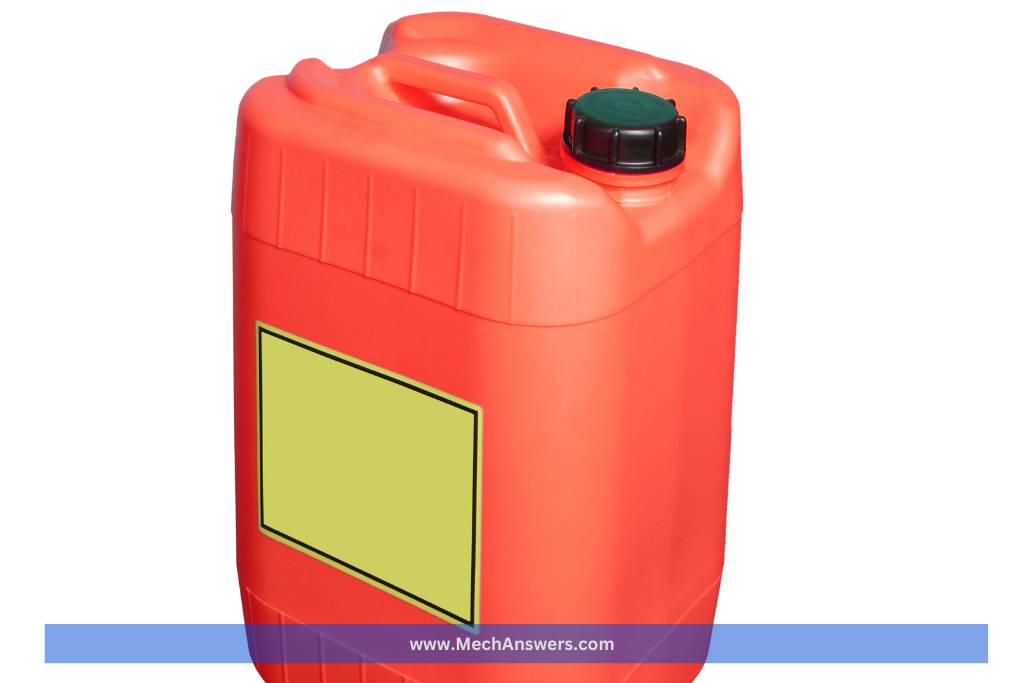
Tips For Proper Diesel Fuel Storage
Proper handling and storage of diesel fuel in plastic containers are essential for maintaining its quality and performance. Here are some tips for proper diesel fuel storage:
Proper handling and storage of diesel fuel:
Always handle diesel fuel with care and use proper equipment and protective gear. Store diesel fuel in a cool, dry, and well-ventilated area away from direct sunlight, heat sources, and ignition sources.
Use a clean and dry funnel to fill the container, and avoid overfilling or underfilling. Label the container with the date of storage and the type of fuel.
Maintenance of plastic containers:
Regularly inspect the plastic container for cracks, leaks, or other damage. Replace damaged or degraded containers immediately.
Keep the container clean and dry, and avoid using abrasive or corrosive materials for cleaning. Store the container away from sharp objects or rough surfaces that can damage the container.
Precautions during transportation:
When transporting diesel fuel in plastic containers, use a secure and stable transport vehicle or trailer that is suitable for the size and weight of the containers.
Use proper tie-downs and restraints to prevent the containers from shifting or falling. Follow the regulations and guidelines for transporting hazardous materials.
Understanding the recommended storage time and tips for proper diesel fuel storage in plastic containers can help ensure the quality and performance of the fuel, and prevent environmental and safety hazards.
Regular inspection and maintenance of the containers are essential for preventing leaks and contamination. Proper handling and precautions during transportation are also important for ensuring safe and efficient storage and transportation of diesel fuel.
How Can You Make Your Diesel Storage Last Longer?
Thankfully, there are several ways you can make your diesel last longer in storage.
Here are a few things you’ll want to consider:
1. High-Quality Plastic
The first thing you can do to make your diesel storage last longer is to invest in high-quality plastic containers. Better yet, purchase a plastic container designed with diesel storage in mind.
When you use purpose-built plastic containers like that, you can rest assured that your diesel storage will remain useful for as long as possible before going bad.
Plastic containers made from high-density polyethylene (HDPE) and low-density polyethylene (LDPE) are the best for storing diesel. These containers are designed to be resistant to damage from diesel fuel and oxidation.
2. Lower Temperature
You can also maximize your stored diesel’s shelf life by placing the plastic storage container in a cool place. The lower the temperature of that location, the longer your diesel will stay usable.
Again, that also includes keeping the plastic container away from any exposure to direct sunlight. Protecting the container from UV rays will also improve the diesel’s shelf life.
Diesel fuel that is stored in a dry and cool environment can last up to one year, while diesel stored in a warm, humid environment can only last up to six months.
3. Fuel Stabilizers
If you need to ensure your diesel lasts longer, you can invest in fuel stabilizers. Fuel stabilizers are added to the plastic container to form a protective layer that helps the diesel last longer.
4. Regular Inspection
Next, be sure to inspect your plastic storage container regularly. These inspections will help you ensure the plastic container’s airtight seal is secure and that the container is free from any leaks.
Catching those problems early through regular inspections helps you fix the problem and preserve your diesel for longer.
5. Fuel Rotation
Lastly, you can consider rotating your fuel. That means using the diesel you stored in the plastic container and regularly refilling it with fresh fuel.
That way, your stored diesel will always be in good condition when you need it the most.
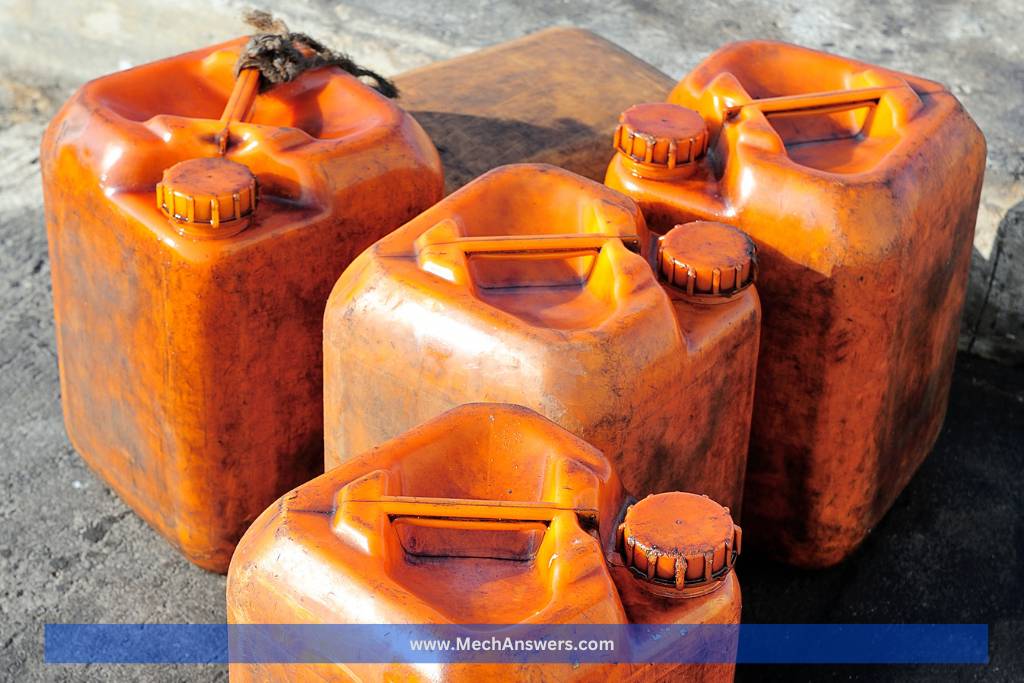
Plastic Container? / Plastic Container
How To Know When Diesel Fuel Has Gone Bad
Diesel fuel can go bad over time and it is important to be able to recognize when diesel fuel has gone bad. Knowing when diesel fuel has gone bad can help protect your vehicle from potential damage and can even save you money.
The most common way to tell if diesel fuel has gone bad is to look for signs of discoloration or cloudiness in the fuel.
If the diesel fuel is any color other than a light yellow, it may be a sign that the fuel has gone bad. Additionally, if the diesel fuel contains any particles or debris, it is a sign that it may have gone bad.
Another way to tell if diesel fuel has gone bad is to check the fuel filter. If the filter appears to have a lot of buildup, it is likely an indication that the fuel is bad.
Additionally, if the filter is clogged, it is likely a sign that the fuel has gone bad. Finally, if your vehicle is experiencing performance issues, such as reduced power or increased exhaust smoke, it could be a sign that the fuel has gone bad.
If you notice any of these signs, it is important to have your diesel fuel tested to confirm that it has gone bad. If it has, it is important to replace the fuel with fresh diesel fuel as soon as possible.
Related Topics
Read more >> Mythbusting: Premium vs. Regular Gas – Facts or Fiction?
Read more >> Can Mixing New Gas With Old Gas Improve Its Quality?
Read more >> Does ’91’ Gas Last Longer Than ’87’? Need-To-Know Facts!
Read more >> What Is The Difference Between 87 And 89 Gas In Performance?
Read more >> How to Dispose of Degraded Gasoline Properly and Safely
Read more >> Summer Gasoline Storage: Tips to Follow!
Conclusion
Storing diesel for the long term can be crucial for many different reasons. For some, that storage could be a lifesaver during a disaster or emergency. For others, it’s a matter of keeping critical diesel-powered equipment running all year round.
You can expect your diesel storage to last 6-12 months when stored in a proper plastic container. Be sure to use high-quality plastic, keep it airtight, and place the container away from direct sunlight exposure.
Also, consider rotating your fuel supplies to keep your stored diesel fresh at all times.

